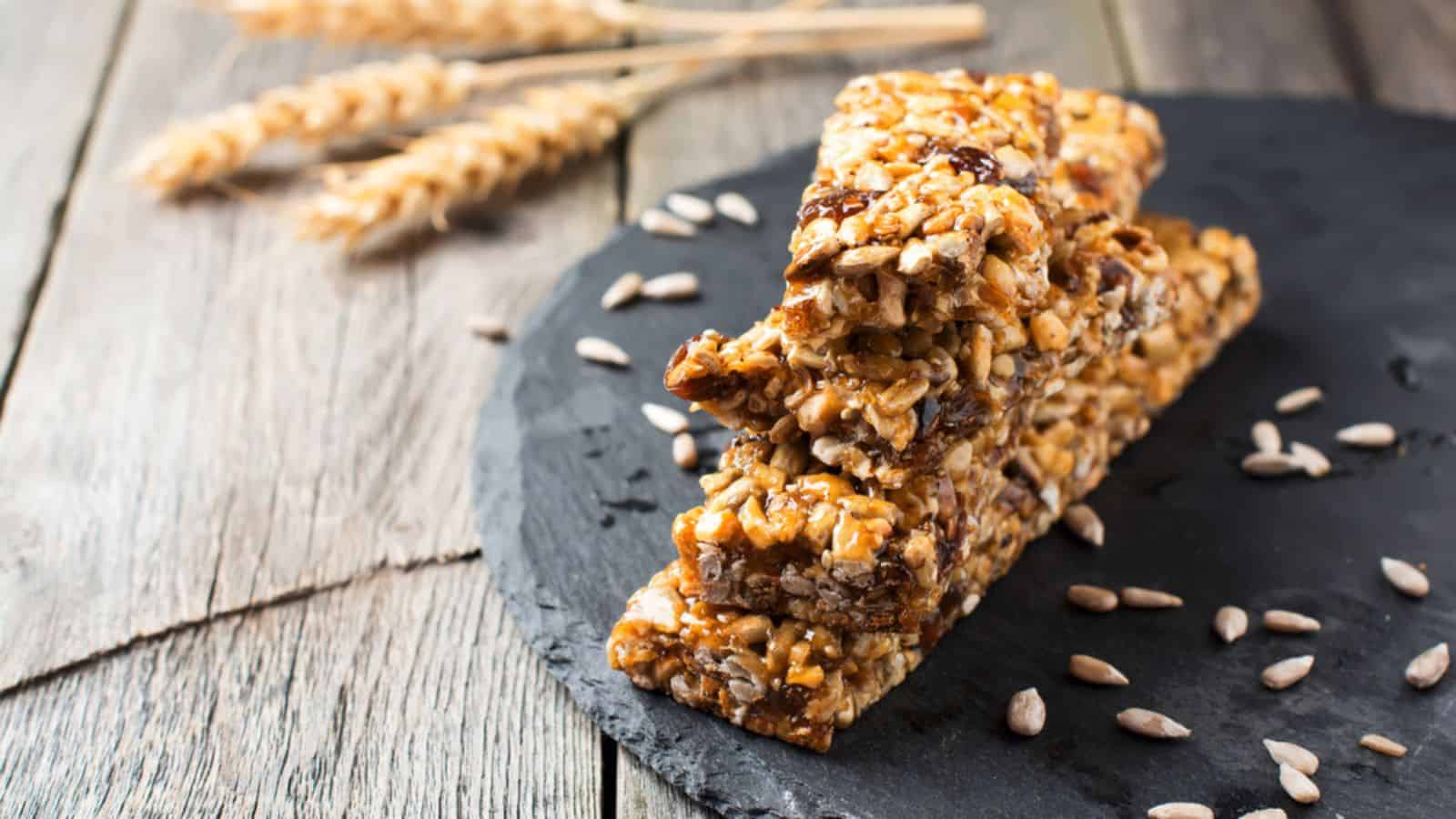It’s becoming increasingly difficult to work out which foods are actually good for us. One reason for this is that there’s an increased use of additives, chemicals, and sugar in our favorite health foods that’s ruining their benefits. It’s important to understand which ones to avoid if you’re on a health kick, so here are some foods that aren’t always as healthy as they seem.
Sports Drinks

Don’t be fooled by sports drink advertisements; while these beverages are good for serious athletes who need to replenish electrolytes, they’re very unhealthy for the average person. This is because they include unnecessary calories and sugar, so just regular drinking water and eating a balanced diet will be sufficient for hydration and recovery unless you’re running a marathon.
Smoothies

These days, store-bought smoothies can be very misleading, as they contain insane amounts of sugar from fruit juices and added sweeteners. Making smoothies at home with whole fruits and vegetables is a whole lot healthier, and you’ll save a killing, too.
Protein Bars

Sadly, many protein bars are essentially glorified candy bars. Just like many products on this list, they contain absurd amounts of sugar and artificial ingredients, counteracting all the protein they contain. For a healthier option, choose bars with minimal ingredients or stick to whole-food snacks like nuts and seeds, which contain plenty of protein.
Granola

Despite commonly being promoted as a healthy breakfast option, many store-bought granola products are loaded with sugar these days, with Healthline claiming that some include up to 17 grams of sugar per bar. This high sugar content can lead to spikes in blood sugar levels, which is not ideal for maintaining energy throughout the day, so we’d recommend making granola snacks yourself to avoid the sugar rush.
Flavored Yogurt

There’s no denying that plain yogurt is very healthy, but the flavored yogurts that you find in shops are not. Just like granola, they’re packed with added sugars, completely ruining the benefits of the probiotics and protein they contain. Thankfully, you can still buy plain Greek yogurt, which is a much better alternative.
Veggie Chips

While you might be buying veggie chips as a healthier option than fried potato chips, they’re often no better. These snacks are usually fried and contain just as much trans fat and salt as potato chips, so the only real benefit is the extra fiber.
Frozen Yogurt

Despite it being seen as a healthier alternative to ice cream, frozen yogurt is, once again, excessively high in sugar and artificial ingredients. Furthermore, the toppings added to frozen yogurt, like candy and syrup, can also add to its unhealthy nature. So, don’t kid yourself–stick to plain yogurt with fresh fruit instead.
Gluten-Free Snacks

A lot of people choose gluten-free snacks in an attempt to be healthier, but this is often a mistake. They generally contain added sugars and fats to improve their taste, which is fine as an occasional treat if you have gluten sensitivity or celiac disease, but not so much if you’re trying to eat healthier.
Fat-Free Salad Dressings

Believe it or not, fat-free salad dressings are sometimes unhealthier than the regular options, as they’re full of sugar and artificial additives. Additionally, some fat is needed to help absorb the nutrients from the vegetables, so they’re actually quite unnatural.
Fruit Juices

Similar to smoothies, fruit juices are generally far less healthy than they might seem, lacking the fiber of whole fruits. Unsurprisingly, they’re also full of sugar, meaning that even 100% fruit juice can cause blood sugar spikes. Make your own juices at home instead, but if you’re trying to reduce your sugar consumption, it might be better to stick to water.
Instant Oatmeal

Despite oatmeal being a wonderfully healthy breakfast item, the Instant oatmeal packets you find in shops are generally heavily seasoned with sugars and artificial flavors. These additions can turn a healthy breakfast into a less nutritious choice, so it’s really counterproductive. Just buy raw oatmeal oats, which are very healthy and much cheaper.
Agave Nectar

Even though agave nectar is marketed as a healthy sweetener, it’s actually made from high fructose content, which can be very damaging to your liver. For this reason, it’s really no better than other sugary sweeteners. Moderation is key, but for general use, natural sweeteners like honey or maple syrup are better.
Whole Wheat Bread

Yet another misleading “health food” is whole wheat bread, which often contains heaps of extra sugar and fillers. Checking the ingredient list is crucial to avoid these unhealthy additives because even when the packaging looks healthy, you never know what’s lurking in your bread.
Trail Mix

For some reason, many people think that trail mix is a healthy snack for hikes, but many pre-made versions are filled with chocolate, sweetened dried fruit, and other unhealthy additions. Just make your own trail mix at home with raw nuts and unsweetened fruit, and you can skip all the trash.
Canned Soup

Despite seeming innocent, canned soups are often high in sodium and preservatives. Even those labeled as healthy or containing “one of your five a day” can have hidden unhealthy ingredients. So, it’s always best to make homemade soup with fresh vegetables and low-sodium broth, which is generally very good for you.
Nut Butters

While it’s true that nut butter can be healthy, the same can’t be said for most brands you find in stores, which use hydrogenated oils and, you guessed it, added sugars. Checking the label for pure nut ingredients with no added sugars or oils is essential, or better still, make your own nut butter at home.
Low-Calorie Snacks

You may be deceived into thinking that low-calorie snacks are good for weight loss, but they often contain artificial ingredients and lack nutrients, making them rather counterproductive. They’ll just leave you unsatisfied and craving more food, ruining your weight loss efforts.
Bottled Green Tea

There’s no denying that green tea is very good for your body and mind, but pre-bottled versions often contain as much sugar as sodas, completely diminishing its health benefits. The antioxidants in green tea are best consumed from freshly brewed tea, so just make your own at home with organic leaves.
Margarine

Not so long ago, margarine was being advertised to us as a healthier alternative to butter, but we now understand that it contains trans fats. These fats can increase the risk of heart disease, so alternative spreads or even butter is generally a better option.
Sushi

The fish content of sushi is certainly very nutritious, but sushi rolls that contain fried ingredients, cream cheese, and sugary sauces are very common these days. You’ll want to avoid them if you’re trying to be healthy, opting for simpler rolls with fresh fish and vegetables or sashimi instead. A bit of wasabi and soy sauce will always be enough.
Breakfast Cereals

Perhaps the most famously deceiving “health food” is breakfast cereal, which, despite being marketed towards children as healthy, is almost always packed with sugars and refined grains. These can lead to energy crashes and cravings later in the day, making them one of the worst breakfast items in existence.

